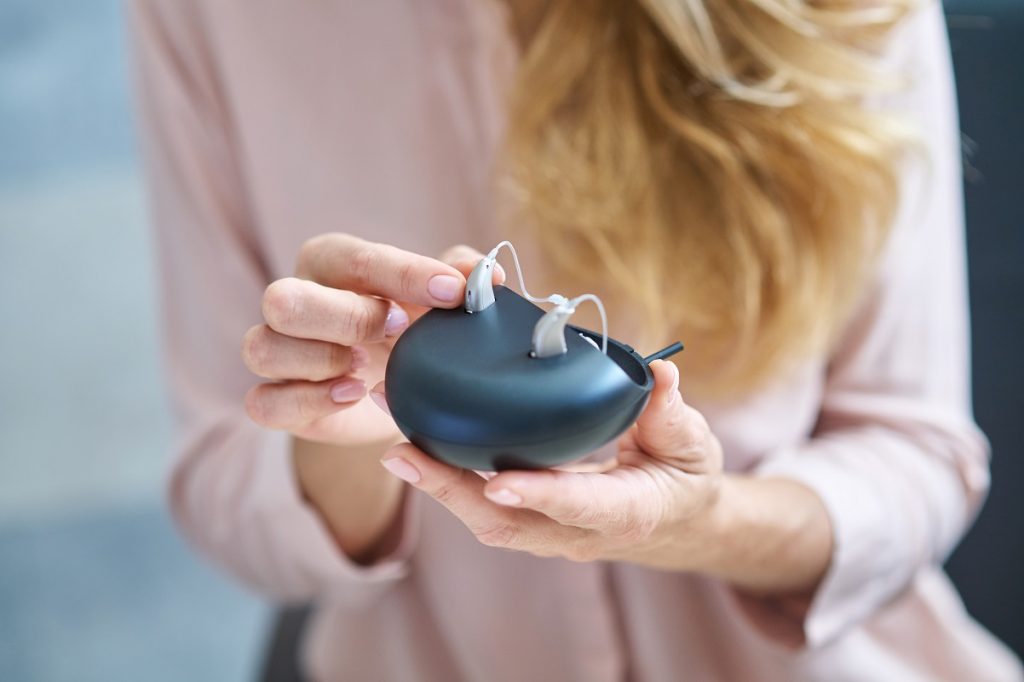There has and always will be a relentless wave of diet and fitness trends that promise the health and wellness boost most crave in this fast-paced world. But what about hearing aids and the audiology industry? As well as supporting better hearing, providing connectivity, and reducing the risk of cognitive decline – what other benefits can these solutions have for those with hearing loss? Paul Harrison, the founder of Hearing Aid UK and audiologist, discusses the industry’s recent offerings of ‘healthable’ hearing aids. Delving into the clever technology designed to promote better health and well-being in your life.
The rise of the ‘healthables’
Health and body tracking isn’t anything new, take the Fitbit wearables and Garmin watch offerings for example. But the ear is historically a great place to gather accurate health tracking information. In so many ways, the ear is the new wrist.
Before healthables graced the audiology scene, hearing aids have always provided wearers with better overall health and quality of life when compared to those who do not. In fact, hearing aids are known to successfully improve communication, self-confidence, mental health, relationships, as well as social and work-life scenarios. That was then, what about now?
Over the past few years hearing aids have had a face-lift, already showing impressive evolution since Starkey’s holistic approach to better hearing with their Livio range back in 2018. In short, these were clever devices including tracking features.
Then 2022 saw Phonak hit the market with Audeo Fit and the first hearing aid, at launch, with a heart rate monitor. We are now into 2023 and this new era of bold healthable technology and philosophy shows no signs of slowing down.
Better hearing, better living
Ensuring better hearing support is at the forefront of all hearing aid technological development, the audiology industry is pathing the way for a multi-purpose attitude towards improving the quality of life for those with hearing loss. Giving wearers who want to monitor their own health and connectivity without sacrificing on listening experience is fast becoming a consumer priority.
Tackling the challenges of hearing loss from all angles with hearing ecosystems that allow the wearer to not just benefit from an optimum hearing experience, personalisation, and connectivity – but to truly thrive will eventually become the ‘norm’.
Empowering you beyond hearing improvement
Hearing aids promote better activity levels and balance because of the environmental awareness they bring. The modern heathable hearing aids offer so much more with digital solutions that play a vital role in healthy living. Offering awareness, tracking and personal data to improve and take charge of your health and well-being.
Hearing aids with health-tracking features has gained popularity in recent years. Such devices not only amplify sound to help individuals with hearing loss hear more clearly, but they also include sensors and technology that can track various health metrics and send the data to a smartphone or other device for tracking and analysis.
One of the main health-tracking features that is often included in these hearing aids is the ability to track physical activity. Many of these devices include sensors that can track steps taken, distance travelled and other metrics related to physical activity. This can be helpful for individuals who want to support and maintain an active lifestyle and monitor their progress over time.
You can now enjoy features such as heart rate sensors, cognitive, engagement and activity tracking that monitor physical movement, social life and how your heart is responding to such efforts. There are also assistive features like fall alerts and reminders, sending an alert to loved ones if you were to fall and reminding you to take medication.
Some healthable hearing aids also supply personal data-sharing features that send information about how well you’re hearing, your movement and engagement – giving peace of mind to those you love or vital data your audiologist needs to make adjustments for you.
AI is redefining what we know
Artificial Intelligence or AI is implemented within hearing solutions and allows for such benefits as greater personalisation, automation and tailored listening experiences. AI also makes healthable hearing aids possible. For example, 3D motion sensor technology like gyroscopes or accelerometers detect gestures, movement and supply accurate information on steps, engagement, and activity, as well as how well you are hearing.
These new health, fitness and well-being hearing aids are slowly starting to dominate the hearing aid market – redefining what a hearing aid can do. Such an influx in technology is answering the consumer tick list of today, as they bridge the gap between the hearing healthcare and consumer tech markets.
These next-generation hearing aids reflect the growing digital nation we now live in, as those with hearing loss simply want more than controlling the way they want to hear and connect. There’s a lot to be said for maintaining your independence and quality of life and the evolved hearables fully embody that. Having the tools that will make a positive impact and have the potential to unleash a healthier version of yourself.
In conclusion
Healthable hearing aids can be useful for individuals who want to track their overall health and wellness, as well as those who may have specific health conditions that require monitoring. By combining the benefits of a traditional hearing aid with the added convenience and functionality of health-tracking features, these devices can help individuals to lead a more active and healthier lifestyle.

